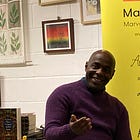Your writing success depends on building community
How building authentic connections with fellow writers can unlock unexpected opportunities, boost confidence, and shape your writing career
I’m delighted to welcome
to . Kern is a novelist who writes , about literature and pop culture. This piece resonated so deeply with me. I too have committed to support other writers by attending literary events. Travelling from rural Somerset to the big city on a cold, dark evening isn’t always my idea of fun, when I’d much rather be curled up our log fire…but afterwards, I’m glad I went and always feel uplifted and inspired by hearing another writer’s story. The author is normally grateful for support, and who knows where it could lead… Here’s to Building Community.It was a cold, dark winter evening in February. I was on my way home from a day at the office for one of my writing contracts and the only thing going through my mind was curling up on the couch with a hot chocolate, binging whatever show I was watching at the time.
But there was a book launch happening right next door to my apartment. As much as my body was screaming for me to lie down, I made a promise that I would immerse myself in the local literary community. If there was a book launch, I would be there (whether I knew the author or not). If there was a reading, I’d be sitting in the crowd listening, ready to ask questions.
Anything literary, count me in.
I attended all these events by myself and prior to that evening, I had kept my promise for close to a year. And it’s not like I wasn’t attending readings and book launches prior to then, it’s just that I’d committed to attending events weekly. I didn’t want to break that promise.
So even though it was a frigid evening and even though I wanted nothing more than to be cooped up in my apartment, I walked past my building to the book launch, by myself again, convinced that the support I was showing was important.
When I got inside I was greeted by the host, Anjula, who by then had seen me at several of her bookstore’s events. She took some extra time to greet me and asked me what I did. I told her that I was an author with two self-published books that were doing pretty well. She acknowledged that she had seen me around and, without any prompt at all, volunteered to introduce me to an agent.
It was so casual. No frills, no “I’ll email you this and that.” She told me to come to her next event because the agent would be there and she would make the introductions. And when I went to her next event, she kept her word and introduced me to the person who would become my first agent.
To make this story even more special, I didn’t even need to query that agent. She took Anjula’s word and signed me after reading one of my self-published books. And for all of you who have ever gone through the querying process or are going through it now, you know how difficult and frustrating it can be. Not having to query was a total blessing.
I tell this story to authors for a reason; there is value in being part of a literary community. There’s value in connecting with your peers with the only expectation being support and some kind of interaction beyond liking posts. There’s so much you get from these connections that sometimes it's hard to quantify.
I remember speaking to one of my author friends before I was published. Her name is Fawn Parker and we’d see each other around the Toronto literary scene. She hosted one of the cooler readings in Toronto called Vacant Nobodies and I actually did my first in-person book reading at one of those events.
Fawn and I were messaging each other one evening and agreed to share a few chapters from each of our WIPs. For context, I had split with my initial agent and signed with a new one, again, without needing to query. He read one of my blog posts and reached out to me about turning that post into a story. I sent him a few initial pitches but he wasn’t overly impressed, and when Fawn and I were speaking that evening, I was a bit down about my writing career.
But I sent Fawn the chapters from a novel I had workshopped in a writing class I took the year before. When Fawn read the chapters, she told me “this is the book you need to be pitching.”
Her words gave me so much confidence, and although the book was very different from the type of story my agent and I had discussed, I sent it to him the next day. He read the first three chapters that night, the full book the day after that, and signed me right away.
That novel became Boys And Girls Screaming and earned me my first publishing deal. It’s not a stretch to say that that wouldn’t have happened without Fawn. And we wouldn’t have been comfortable enough to read each other's work and give feedback if I hadn’t made it a priority to engage with my local literary community.
But what does that mean? What does it look like to properly and authentically engage?
I know the “N” word (networking) is taboo amongst authors, but to be honest, I really don’t feel that is what I’m doing. I am simply giving to a community that has given me so much. I’m supporting the people and stories I want to see win by showing up, by making it my responsibility to participate beyond liking a post. And yes, likes are important, but there are levels to community building and community support that stretches beyond that.
When my creative partner and I set out to produce our first film, we had no idea what we were doing. We applied for a grant and somehow were selected, without any experience outside our love for storytelling. And when I say we had no experience, I mean that literally; we had absolutely no film experience.
But what I had was a community of writers and artists and actors and amazingly creative people who I had connected with and supported throughout the years. I reached out to one of those connections, an actor named Shailene Garnett, and she walked me through the entire process, including connecting me with the person who would become our Line Producer.
I met Shailene years earlier when I interviewed her for a magazine where I was the Lifestyle Editor. Shailene has the type of personality you remember, and we stayed connected as she moved back and forth between LA and Toronto. So when I reached out to her about producing my first film, it wasn’t an uncomfortable discussion. She was more than willing to help.
These are the types of unforeseen benefits that come with the authentic connections you make from being part of a community. The support, the championing, the confidence of knowing that you are not alone in your journey.
But it takes work.
I don’t think you build community passively. You have a responsibility to participate in the relationships that you are forming and the level of reciprocity depends on your level of engagement.
I know many of us are introverts, but we all love literature. That’s what binds us together. Let that passion guide you to building your community. A simple comment on a post, a direct message to someone you admire, then a conversation outside of the platform. This is how community is built - one by one, person by person, interaction by interaction. You don’t need to overwhelm yourself, but you also can’t sit in the corner and expect to feel the support and sense of belonging that comes when you’re actively engaging.
One thing to keep in mind is that community happens at different levels. Some people will like posts, some will comment, some will read your books and you’ll never hear anything more from them. What you need to decide for yourself is your own level of participation. I find that I am more naturally drawn to some writers more than others and so I go with my gut.
I always encourage authors to start local. Depending on the city or town, some literary scenes are more active than others. That’s okay. One thing to keep in mind is that you don’t only need to stick only to books, especially if you have a smaller lit scene. I have relationships with artists and art galleries along with my film peeps, and I developed these relationships even though Toronto has an incredibly active literary community. Artists are similar beings, and getting to know them helps you feel less alone because they intrinsically understand your journey.
I remember attending a random event for artists and entrepreneurs way back when I had just self-published my first book. I just wanted to enjoy the energy of the room and wasn’t really looking for anything more than a good time, but then I met someone and we sparked up a good conversation. We exchanged contacts and that same week, he invited me to a writers group he was a part of.
That writing group met once every two weeks, and for the next two years, attending our biweekly sessions became my routine. We called ourselves the Writers Circle and they inspired me to challenge myself when writing my second self-published novel, Beauty Scars. Being around that group opened me up to all types of storytelling—Eastern European, Middle Eastern, Pakistani—and even though they never directly contributed to my novel, the osmosis was real and so much of that group’s spirit is in those pages.
So many of my experiences have happened in-person, which is the main reason I say start local. But obviously there are benefits and opportunities to connecting online.
When you’re engaging online, just let your gut guide you. Don’t base your engagement on any specific agenda other than connection. You want to feel comfortable communicating with people and you know yourself better than anyone else, so trust your instincts.
And here’s the thing: writing helps build community, also. The topics you write about, the books you author, those are calling cards. Readers will be attracted to those stories and reach out, but they need somewhere to interact. Substack is one of those places, so is social media; it just depends on where you feel most aligned. But you need to be active somewhere so when someone does feel called to connect, it makes it easy. All you need to do is pay attention and respond.
And when you’re writing to build community, you speak to them directly. You speak in your collective lingo, with the idiosyncrasies that all of you understand. You send out your message and know that they will get it, and when they do, they tell someone else, and that person tells someone else. And if you keep at it, you’ll have dozens, then hundreds, then thousands of people waiting for the next message (book, post, newsletter) while talking about the prior one.
This is the power of your words.
I believe that building community today is the most important and most valuable step an author can take to establish their career. We’re writing in a fractured media landscape, fragile social media ecosystem and a pernicious political system. When you build a community, it forms a sort of bubble to insulate you from the chaos and uplift you when you need it. They support you, they champion you, they buy your books and they subscribe to your newsletter.
This is community.
What do you think? What is community to you when it comes to writing? Do you try and support writers at local events?
You might be interested in reading:










What a great post! Building community is so important. Two years ago I joined a writing group and moved my newsletter to Substack, and I'm so glad that I did. Both have offered me such valuable opportunities to engage with other writers.
An inspiring post. Thank you both.